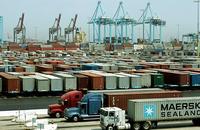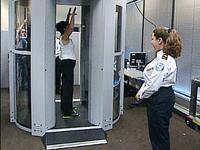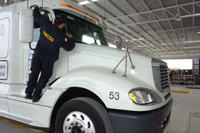-
TSA fired an agent for being a witch
TSA fires a security screener at New York’s Albany International Airport for being a witch; the screener, who practices Wicca, was accused by a fellow worker of casting a spell on her (the fellow worker’s) car’s heater so it would not work; when the screener refused to participate in mediation to dispel myths about Wicca, she was terminated
-
-
Detecting critical flaws in railroad lines
Rails are the only thing keeping trains weighing thousands of tons travelling anywhere from 70 to 160 miles per hour grounded, thus any flaws or imperfections in these rails could result in accidents or major delays; railroads transport more than 25 percent of the goods in the United States including critical resources like coal, lumber, chemicals, and grain; one firm has developed the technology to detect flaws in rails that could cause major disruptions or delays; most flaws occur inside the rail and cannot be seen with the naked eye
-
-
TSA looking for shoe scanning devices
DHS is seeking companies to which it will award a contract for shoe scanners; according to the Office of Federal Business Opportunities, the Shoe Scanning Device (SSD) system currently sought by the TSA and DHS “will be capable of detecting threat objects concealed in footwear without requiring passengers to remove their footwear as they pass through a security checkpoint. These threat objects include a wide variety of military, commercial, and homemade explosives or explosives devices”
-
-
Authors suggest ways to alleviate L.A. cargo port "constipation"

In January, the port of Los Angeles received more than 330,000 containers; the possibility that one of those 330,000 containers could have contained a dirty bomb, or worse, keeps security experts up at night; experts say that to ensure security and prevent logjams, the best approach to container security would be to replace the current system, which singles out only those containers whose documentation raises questions, with a system which will see terminal operators X-ray every container, regardless of its eventual destination; only those containers flagged during the low-level scan would be subjected to a more thorough search
-
-
TSA considering "identity-based" screening
TSA does not call it “profiling,” but “identity-based screening”; the department is asking for public comments on the proposed system; “Physical screening will likely never go away completely, but the idea of adding identity-based security makes good sense and it’s an idea we’re actively exploring,” the department says
-
-
The color of truth is always gray
Those who object to thorough security checks at airports have every right to hold on to their belief that TSA employs methods are too intrusive, but the majority of travelers prefer greater safety even if achieving it may compromise some people’s notions of privacy. We should recall the era when smoking was permitted on planes: you could choose to sit in either the “smoking” or “non-smoking” seats; trouble was, a plane is a closed tube, so within minutes of take-off, everybody on board was engulfed in cigarette smoke, whether or not he or she was a smoker. By the late 1980s the airlines, with government encouragement, banned smoking on planes. The reason: smokers have rights, but they have no right to turn non-smokers into second-hand smokers and thus heighten non-smokers’ risk of dying of lung cancer. There is a lesson here for the debate over privacy and security at airports: we should assume that some people feel strongly that their privacy and dignity are being compromised by full-body scanning. We should respect their views. But they have no right to ask the rest of us to take greater risks with our lives because of their strongly held views with regard to privacy.
-
-
Sector Report for Thursday, 17 March 2011: Transportation Security
This report contains the following stories.
Plus 2 additional stories
-
-
TSA retests body scanners amidst radiation exposure concerns

The Transportation Security Administration (TSA) recently announced that it was retesting all of its full-body scanners over concerns that they were emitting high levels of radiation; maintenance records have shown that some scanners emitted radiation levels ten times higher than expected; TSA says that these increased levels were simply the result of a math mistake and that the machines do not pose a health risk; one type of body scanner in use relies on backscatter X-rays which produce very low levels of ionizing radiation; experts worry about the long-term effects of repeated exposure at low levels
-
-
Battle over private airport security screeners rages on
Republican lawmakers launched a fresh set of attacks against the Transportation Security Administration (TSA) in the continuing dispute over the private security screener program; Representative John Mica accused the TSA of inflating cost estimates of the private security screener program in an attempt to end it; the charges come after a new Government Accountability Office (GAO) report was released that found private security screeners would cost just 3 percent more; in 2007 TSA published a study that found using private screeners would cost 17 percent more
-
-
Trusted Traveler program may come back
A report, commissioned by the U.S. Travel Association and released Wednesday, calls on airlines to allow passengers to check one bag free of charge and urges the creation of a voluntary “trusted traveler” program that partially resembles a mandatory one previously proposed by President George W. Bush — and canceled by Congress; Napolitano touts the “airport checkpoint of tomorrow”
-
-
The health effects of airport security scanners
The Transportation Security Administration (TSA) has begun to use whole-body imaging scanners as a primary screening measure on travelers passing through airport security checkpoints; one type of scanner employs millimeter wave technology, which delivers no ionizing radiation; the second type of scanner currently deployed at airports, however, uses backscatter X-rays that expose the individual being screened to very low levels of ionizing radiation; what are the health implications of these scanners? Two prominent radiologists offer answers
-
-
Monitoring Mexican trucks operating in the U.S.

The U.S. plan to equip Mexican trucks with electronic recorders for driver logs would be a limited, temporary program undertaken because it is the only way the Federal Motor Carrier Safety Administration (FCMSA) can ensure that the Mexican trucks will be monitored, the U.S. government says; under (NAFTA), the United States cannot require Mexican carriers to do anything that U.S. carriers are not required to do, but the government still must provide a way to monitor Mexican carriers for compliance with both the hours of service rules and the cabotage rules that restrict freight hauling between points in the United States
-
-
Air cargo screening lagging
The Government Accountability Office says the U.S. Transportation Security Administration (TSA) is still contending with issues reported last June that could affect the agency’s ability to meet an end-of-year deadline for screening all international cargo on passenger aircraft
-
-
Alaska Airlines sorry for detaining passengers over tefillin
Alaska Airlines flight attendants, concerned by the prayers of three Orthodox Jews being said aloud in Hebrew and the unfamiliar tefillin — the boxes with leather straps hanging from them, which orthodox Jews wear when praying — locked down the cockpit and radioed a security alert ahead to Los Angeles International Airport
-
-
NYPD's combat vessel will thwart Mumbai-like attacks
To prevent a Mumbai-like attack in New York, the NYPD will be getting a high-speed combat vessel; the 71-foot craft, which can hit speeds of 40 knots and will be able to carry up to thirty police officers fully armed with heavy weapons; the high-speed boat will be outfitted with radiation detection equipment and infrared cameras, as well as a satellite communication facilities
-
More headlines
The long view
Calls Grow for U.S. to Counter Chinese Control, Influence in Western Ports
By Bing X
Experts say Washington should consider buying back some ports, offer incentives to allies to decouple from China.
